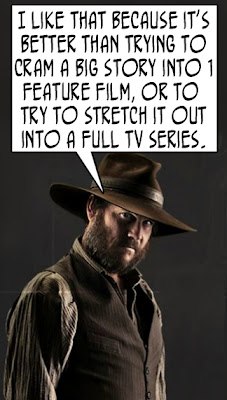 The feud between the Hatfield and McCoy families has been turned into a TV miniseries by the History Channel starring Kevin Costner and Bill Paxton and it's a smash, setting a new record for basic cable viewing. In fact, the mainstream broadcast networks would like numbers that like, and now some are talking about the return of the miniseries, which was a staple of TV for a long time before being forgotten.
The feud between the Hatfield and McCoy families has been turned into a TV miniseries by the History Channel starring Kevin Costner and Bill Paxton and it's a smash, setting a new record for basic cable viewing. In fact, the mainstream broadcast networks would like numbers that like, and now some are talking about the return of the miniseries, which was a staple of TV for a long time before being forgotten.
Now a miniseries, or "serial" as the Brits like to call it, is a show that has a predetermined number of episodes with a definite beginning, middle and end. This has advantages when it comes to narrative, because unlike a regular TV series, you not only can drastically change the nature of the story, and the characters as the story progresses, it's actually better if you do that. A regular TV series can't have changes in premise and characters that are too dramatic, because it's supposed to have an open ended run. You can't have a character go on a self-destructive death spiral without having to pull some sort of a miraculous rescue out of your ass to milk another season out of it. You can do that in a mini-series, because it actually has an ending coming.
The miniseries evolved from the TV movie which had become incredibly successful for the then "Big 3" networks in the late 1960s and early 1970s. Adaptations of popular novels was seen as the next big step, but there was a problem, too many of the most popular novels were really thick tomes, with large casts of characters with plots spanning several generations. Cramming them into a 90 minute TV movie or a 2 hour theatrical feature film was seen as an impossibility without taking an axe to the story that readers seemed to love.
Enter the miniseries.
The first miniseries in North America were the CBC's documentary/drama hybrid about the founding of Canada The National Dream, and the American ABC Network's adaptation of Leon Uris' QB-VII both in 1974. The format became a phenomenon with the success of Rich Man, Poor Man in 1976, and a mega-phenomenon with the blockbuster success of the adaptation of Alex Haley's epic family saga Roots.
By the 1980s all three of the big networks were making and airing miniseries, and most of them seemed to star Richard Chamberlain. Even when he wasn't hired, he'd just appear as an extra.
But by the 1990s the bloom had gone off the miniseries rose. There were two causes for this, creative and commercial.
The creative cause occurred as the networks began to abandon the expensive historical epics like James Clavell's Shogun, and make more modern, more soap opera-like adaptations of the works of authors like Jackie Collins. The problem with this tactic is that while the works were popular, there wasn't much to differentiate them from other prime time soap operas like Dallas, or Dynasty. So the popularity of the miniseries began to wane.
The commercial cause came from the fact that the networks had changed their business model and it looked like miniseries didn't have a place on network TV anymore. Most of the networks had either merged with movie studios, or formed their own production companies. The plan was to produce their own shows, via their sister studios and production companies, and get a piece of that sweet, sweet syndication money.
An 8-12 hour miniseries wasn't going to sell to syndication which required a minimum of 66-100 hours to create a viable rerun cycle.
So bit by bit the miniseries just faded away from the big broadcast networks and, for the most part, took TV movies with them.
However, things have changed.
First, cable television has changed the playing field. Serialized dramas, especially costume dramas and literary/historical adaptations, are particularly hot right now with audiences.
The syndication market has also changed, with time slots once held by syndicated reruns are now dominated by talk shows, game shows, and infomercials. Even Cable TV, which was once a prime market for reruns is slowly drying up in favor of new original programming.
Why?
Well, it's one of the reasons why miniseries might make a comeback.
Home video.
People aren't watching reruns the way they used to because now they can just order them up from Netflix or some similar streaming service, or buy them in a box set from their local big box store.
This means that miniseries can have a life beyond their initial airing via these new outlets, and hence continue to generate revenue.
I for one would welcome the return of the miniseries to mainstream television. It's a good way to adapt big projects that wouldn't fit well into a two hour feature film, or stretch out into an open ended TV series, and allows writers and actors to create and play characters with definite narrative arcs.
Plus it would mean more work for Richard Chamberlain who I haven't seen on TV in a long time.



Well said, after having had to endure the most unlikely twists in the plot of a TV series (starting out with Bobby coming back to life in Dallas) I would love to see more miniseries where you know what to expect. BTW Richard Chamberlain is still around on TV, guess where? Yeap, in a TV series: last year he could be seen in Leverage and in Brothers & Sisters.
ReplyDeleteI thought he retired a few years ago, anyway it's good to see he's still working. He was always very likable.
ReplyDelete